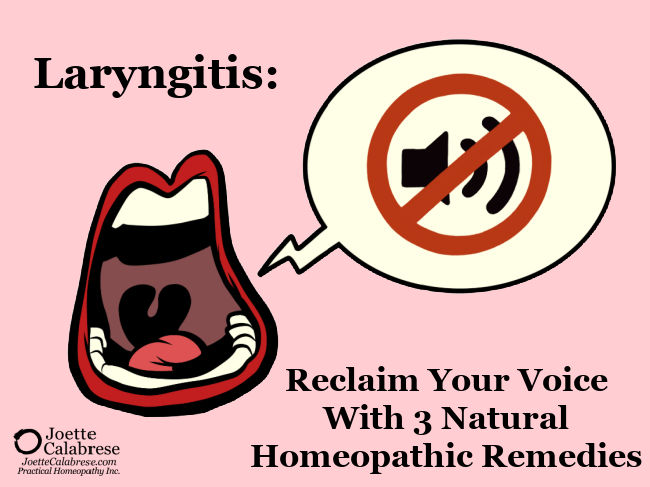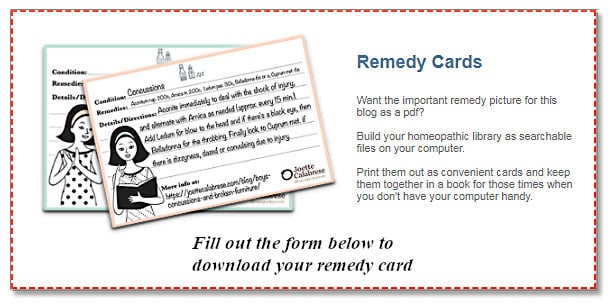They say silence is golden, but I’m pretty sure they didn’t mean laryngitis.
Especially during cold and flu season, laryngitis can add insult to injury. One of my Mighty Members recently wrote me asking how this common ailment might be addressed with homeopathy.
Generally speaking, laryngitis that accompanies an acute respiratory illness is not particularly serious, but yes, it’s annoying.
Keep in mind, however, that today we are discussing loss of voice (aphonia) or hoarseness of voice (dysphonia) due to respiratory conditions rather than other causes, such as covered in “Spasmodic Dysphonia: Robert F. Kennedy Jr.’s Rare Voice Condition. Can Homeopathy Help?”
As I’ve said before, there is more than one way to shear a sheep in homeopathy. That’s why, in the absence of a specific practical protocol, it’s essential to own a materia medica to help you discern the best option. Reading the entry of each potential homeopathic remedy for the symptom makes it easier to “home” in on the best choice for the entire condition being addressed.
Indeed, many remedy choices may be appropriate for a loss of voice. Consequently, we would be well advised to consider the complete picture accompanying it to differentiate between our three top medicine choices.
Laryngitis accompanied by excess salivation
In fact, I spoke about excess salivation as a common symptom of respiratory illness in my Monday Night Live on January 13, 2025, regarding strep throat. (Mighty Members can find that recorded event through the MNL search function on their Mighty Dashboards and listen to the private follow-up conversation I have each week after I sign off with the public. I’m inclined to answer their questions more candidly on our private servers, away from the prying eyes of public social media.)
When excess salivation is an issue, Mercurius solubilis 30 or 200 (depending on severity) is often our tightest fit. (Note: Mercurius vivus and Mercurius solubilis are generally considered to be interchangeable.) Other accompanying symptoms that may call for Mercurius sol for laryngitis are halitosis, pustules on the throat or tonsils, or even ulcers in the mouth and throat.
Laryngitis accompanied by chest involvement
When aphonia or dysphonia is associated with a “chestier” sensation — meaning that the condition is not exclusively focused in the throat, we may consider Phosphorus 30 or 200 (depending on severity). This would be our top medicine to explore when laryngitis results from bronchitis.
Laryngitis accompanied by painful sore throat
Occasionally, aphonia can be intermingled with an excruciating sore throat. The throat may also feel as though a stick or a splinter is stuck in the throat. Often, in these cases, the lymph nodes under the ear and the tonsils may also be extremely swollen. These symptoms are a clear indication that Hepar sulphuris calcareum (Hepar sulph) 30 should be considered.
Why? Read more about this powerful homeopathic medicine in my previous blog, “Hepar sulph: The Homeopathic Antibiotic?”.
Determine the frequency for the chosen homeopathic medication
In any acute situation (meaning not a chronic illness that has lasted for months or longer), the medicine is best used at a frequency that meets the severity of the condition. That’s a fancy way of saying that if the condition is reallllllly serious — and I do mean several “Ls” — the medicine may be used more often. As the condition begins to improve, dial back the frequency.
For example, if a sufferer has a bloody nose with just a little bit of blood that can be controlled with a dab of tissue, they might take the appropriate homeopathic medicine only twice a day. (And probably for only one day.)
However, if the blood is streaming from the nose — it won’t stop bleeding — the medicine may need to be utilized every 15 minutes or less to address the acute condition!
Likewise, if garden-variety laryngitis is merely annoying, one may employ one of the medicines mentioned above twice daily.
But if it’s serious — with intense pain and/or difficulty swallowing — the sufferer may use their chosen remedy every 3-6 hours, depending on severity.
Isn’t that just common sense? That’s one of the beauties of homeopathy — one of the many beauties, I might add. It’s a sensible medical paradigm. We only utilize medicines to address a presenting condition and use them according to our observations as the illness changes.
Pass on the good news of Practical Homeopathy®!
Warmly,
P.S. Learn more about this gentle, natural, sensible and effective medicine in one of my Gateway to Practical Homeopathy® study groups. In this fun, guided curriculum, you and your study buddies will learn the basics of homeopathy, plus protocols for common conditions that you and your family experience.
Whether you are new to homeopathy or have tried it in the past with mixed success, you will benefit from learning my brand of Practical Homepathy®, a less esoteric, more accessible approach to the paradigm. Plus, you’ll be given the opportunity to meet with me for a live Zoom meeting to ask me your questions.
In fact, one of my recent students sent this email to my study group coordinator:
“The Live Q & A with Joette was a positive experience. Joette is a great teacher and speaker. She is very enthusiastic about homeopathy and answered everyone's questions in a way that we could understand. The experience motivated me to continue to learn more. It was nice to be surrounded with so many like-minded people (students) who want to use homeopathy to improve their health and the health of their families and communities.” — Sharon S.







Joette! I thought that Merc Sol & Merc Viv we’re interchangeable, but it was a “sin”/cyn to use Merc Cyn interchangeably with either of the others. I have heard this in many Gateway classes, I have it written down, and I just told this to my gateway one study group members! Please clarify.
Merc sol and Merc viv are interchangeable; not Merc cyn.
I misspoke in a class indicating Merc cyn was included but that is not so.